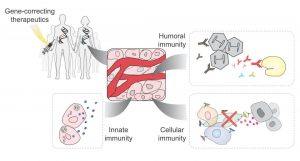Genome-editing by CRISPR-Cas9 is one of the most important scientific breakthroughs of the modern era. With the ability to delete, insert, and rewrite DNA sequences in the test tube, in cells, and in the living body, we are witnessing an exciting wave of new therapeutic approaches that promise to change healthcare and medicine.
The impact to human well-being becomes salient as genome-editing therapeutics now enter clinical trials. In a recent WIREs Systems Biology and Medicine review (Chew, 2017), the author discusses how these new medicines could evoke human immune responses and how these reactions would impact the patients. This Review draws on past experiences with gene therapy and postulates how the design and administration route of CRISPR therapeutics could determine their immunogenicity. Predictive algorithms show which sequences within CRISPR Cas9 and Cas12a proteins could engage the human immune machinery. Potential solutions to minimize and negate the immunogenicity of CRISPR therapeutics are proposed.
We are bound to see a lot more of genome-editing therapeutics entering our lives. Safety considerations remain, or perhaps become even more, important as new and improved CRISPR systems and therapeutic modalities are established. Much of the foundational safety evaluations were built on reducing the risks of CRISPR-Cas9 off-targeting, where the CRISPR-Cas9 complex disrupts genomic sites that are similar in sequence to the desired target site. We now have to evaluate and resolve the risks of immune rejection when these therapeutics are administered into the patient. It is then that we can truly achieve safe and efficacious genetic cures.
Kindly contributed by the Author.

















